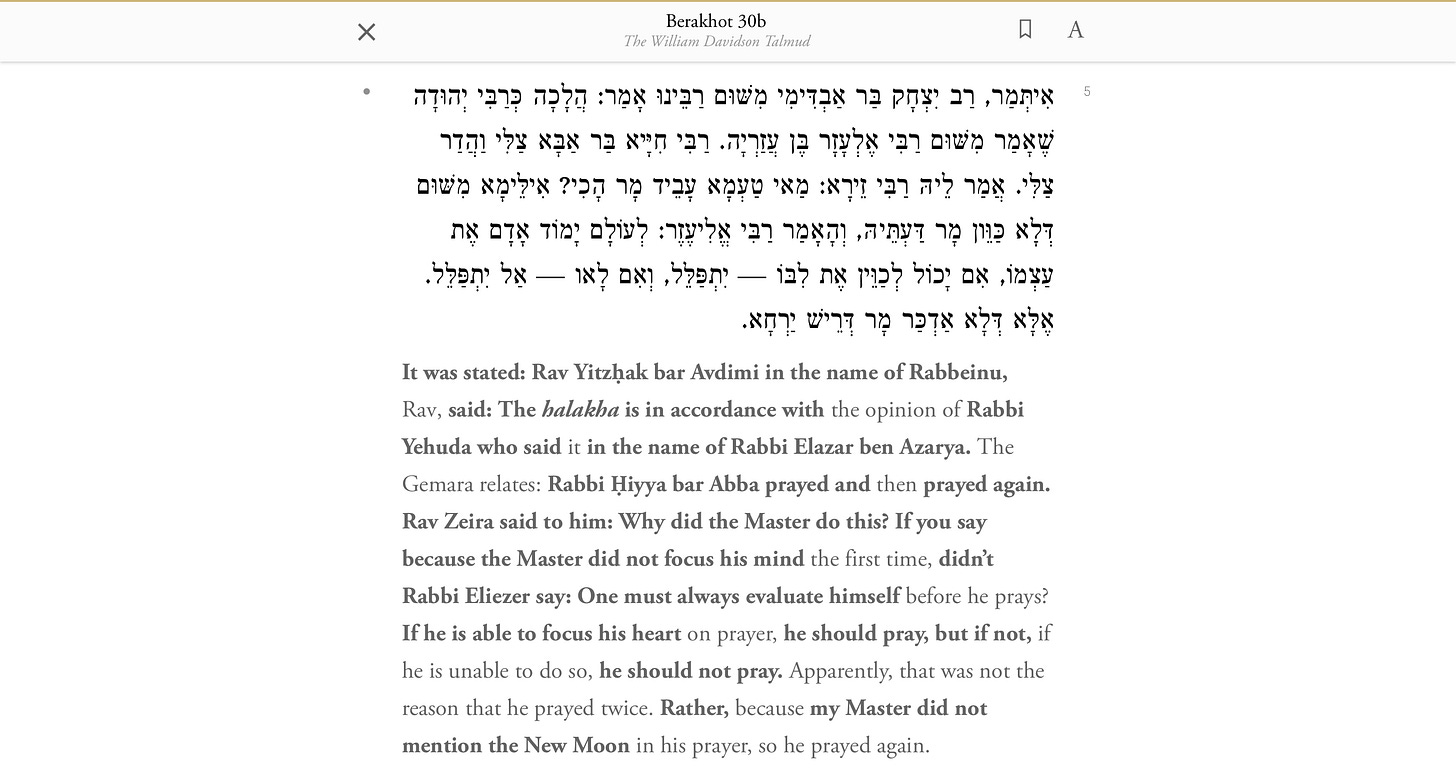Do not Pray if You Are Unable
Thoughts and Reflections on this statement from the Berakhot Tractate of the Talmud
“If you can’t pray then don’t”
“… didn’t Rabbi Eliezer say: One must always evaluate himself before he prays? If he is able to focus his heart on prayer, he should pray, but if not, if he is unable to do so, he should not pray.” — Berakhot 30b (Talmud)
As the Resident Tribal Reject Alien, situated Outside The Camp, I have some thoughts on this statement about prayer.
I obviously know nothing, being a twice over religious apostate who is learning Biblical Hebrew, independently at my own cost, to be able to read the Hebrew bible and to learn Jewish prayers, also independently.
I have spent my life as the spiritual version of The Littlest Hobo, looking for g-d and the ability to pray to g-d, finding humans and trying to commune with them etc etc, so naturally I’m a village idiot to whom no one listens. At any rate, these essays I write are a form of worship and prayer because they’re self examination and meditative reflection, as opposed an exercise in external validation, ie glory seeking, or even being seen by others.
So, on further reflection I don’t give a fcuk if you, whomever you are, aren’t interested in my opinion and thoughts on this or anything. Piss off, then. I’m doing a thing to reach g-d and you won’t get in my way, muppets.
Anyhoo.
My thinking is that many people pray to say they did it. It’s a performance. Well, a performance is not real, it’s a lie you tell yourself. It’s using g-d to show off.
When I was a Catholic I found prayer difficult because g-d wasn’t there—I didn’t feel Her/Him. I went to church faithfully, for every holy day of obligation. Prayer served obligatory purification, like a wine filter functioning to remove the sediment from the wine to make it taste better. My brief trial as a Muslim was a fail, g-d wasn’t there either. Prayer was impossible for me to do. I never went to a mosque, I never felt connected to anything Muslim. I tried to make it fit and it felt only like I put on an ill-fitting cloak or dress. I literally could not pray I felt removed from g-d — my body would not perform prayer and my heart couldn’t find the connection to pray.
Prayer is not just these ritual words we memorize and chant at designated times. In behaviour psychology when we must do something for payment or points or credit, that action becomes a burden and not a blessing.
The death of my mother gave me the ability to pray and reach for g-d. Maybe that was her final gift to me? My love for g-d came from my devoutly Catholic mother, who modelled piety, g-dcentricity, and a faith-based life for me, more than anyone else in my life. The October 7th, 2023 massacre gave me another opening to reach for g-d, as I bore complete and heart wrenching witness to the atrocities committed against Israelis.
Do we choose g-d, or not?
As far as I know g-d gives us free will. And we are here to use it. So when we choose to use g-d to show off our piety or to tick off a box on a list of holy obligations we are serving ourselves and not g-d, we are choosing self-worship. It’s vile, really. It’s why organized religion irritates me, because people are assholes performing a part in a stupid play. Organised religion often resembles idolatry to me.
In French, my childhood Catholic religious language, prière is the verb meaning to pray. It’s like the English verb, pray—a request you make. We say, pray tell me, as an expression in French and English actually, when we are humbly asking a question of another.
In Islam, the Arabic word for praying/prayer, salat, derives from the root that means to connect, to link, to unite.
In Judaism, the Hebrew the verb to pray hitpa’el is a reflexive one, implying self examination. This is where g-d is, within me, and that’s why it works for me.
The word for judgement is also derived from the Hebrew verb root for praying, interestingly. Implication being, judgement and compassion are dual traits of Divine. Recently, in a seven-part seminar course with Rabbi, I learned about the two names of g-d, Elokim and YKVK1, and Fohrman’s very profound insight about these two names—the former a g-d of judgment and the latter a g-d of compassion—was that judgement serves compassion. Elokim is the messenger of and in service to YKVK — if we can imagine an abstract hierarchy within the Divine Herself. I appreciate the nuance of this conception of g-d, it certainly provides a new lens through which to view the world around me, and within me, and most delightfully of all, it affords a new lens through which to explore the Torah.
Adam (who contained both male and female components of humanity within one form until divided later on)2 was formed from Adamah, the earth, and g-d blew into his nostrils. The story of creation draws many parallels between humans and trees. A tree has roots beneath the ground and the proliferation of a tree’s foliage has a direct connection to its root system. As below so above. Trees connect the earth with the heavens, they breathe and they grow. Humans have a root system within, the breath of life powers us, the nervous system being its most important manifestation, in particular the myelinated ventral branch of the vagus nerve.
Praying in Judaism plays a part in the human tree branching out. Imagine your lifeforce within you and imagine growing that like a tree, in the abstract sense. Those familiar with Steven Porges’ work will appreciate the Judaic meaning and purpose of prayer I present here in this essay.
There is an obvious difference in the way to communicate with g-d here. It’s fascinating to me, who has searched and toiled all my life from Outside the Camp to be able to pray in earnest to g-d.
So let’s summarise the meaning + purpose of prayer in each of the Abrahamic religions:
Christianity — request to g-d for salvation
Islam — connecting with Allah in submission
Judaism — reaching for g-d via self examination
Intentionality for humans originates in the heart, not the head.
The facial muscles are directly connected to the heart.
There is no mind body dichotomy.
Made in the image of The One G-d, human is a whole + united entity — from brain stem to bowel.
The vagus nerve, Cranial Nerve X, is the longest nerve in the human body—beginning at the medulla oblongata of the brain stem, and innervating the face, lungs, heart, gut. What does praying with internationality mean, what does it require? Prayer with an intentional and sincere heart requires us to reach our ventral vagal level of social engagement, meaning, to rise out of reptilian mode, meaning, to rise out of survival mode, meaning, to be present with ourselves fully without judgment or id-based thinking. G-d made us in Her image, therefore to truly reach the Divine means to reach within ourselves to find that Divine part of ourselves.
When we attempt to pray and our heart is not in it, aren’t we violating the second and third commandments—take no other g-ds and do not use g-d’s name in vain? If we pray without intentionality for g-d, we are praying for and to something else, making that shallow ungodly intention in our hearts our g-d for the moment. We each have our golden calf moments, from which we fight against ourselves to break free.
G-d lives within each of us before anywhere else. That’s a profound and multilayered statement and through our prayers we cannot reach g-d unless we have pushed through the layers of our lower self to give birth to our desire for Hashem, the g-d of Compassion. Think of giving birth — the forceful contractions that hurt like hell and bring a great treasure into being. It’s the most important and profound and painful act a mother performs. Give birth to yourself in order to reach g-d.
So, if you can’t find it in you to pray, then examine your Self to find out what block obstructs you from reaching g-d. The answer is within you, always within. You cannot know g-d without knowing your own heart. The purpose of your existence is to remove all obstacles to Love that exist within you. Run toward the blocks and not away from them.
Mais, je ne sais rien du tout.
In keeping with the tradition of Judaism I do not write out the names of g-d, out of respect for the Divine, so convention dictates we use the English letter K instead of the letter H aka Hay.
It’s a chamber and not a rib that g-d took from Adam to form Eve, that’s the original Hebrew language employed in the Torah creation story.







This is a refreshing take.
Can I add something about not skipping prayer for a day?
I gathered that these are your thoughts and you don’t want to be disturbed.